SpringBoot 整合文件上传 elment Ui 上传组件
SpringBoot 整合文件上传 elment Ui 上传组件
本文章记录 自己学习使用 侵权必删!
前端代码
博主最近在学 elment Ui 所以 前端使用 elmentUi 的 upload 组件实现
- 因为 elmentui 是基于 vue 的环境 使用的 所以我们 得引用 vue 的 js 文件
引入 elmentUi 的 css 和 js
我们采用官网的这种 cdn 的方式
- 本地的引入的方式 容易导致elementUI与 vue 版本不匹配
- 出现
Vue warn]: Injection “elForm” not found报错解决方法
<!-- 引入Vue -->
<script src="https://cdn.jsdelivr.net/npm/vue/dist/vue.js"></script>
<!-- 引入样式 -->
<link
rel="stylesheet"
href="https://unpkg.com/element-ui/lib/theme-chalk/index.css"
/>
<!-- 引入组件库 elementUi-->
<script src="https://unpkg.com/element-ui/lib/index.js"></script>
项目的目录结构:
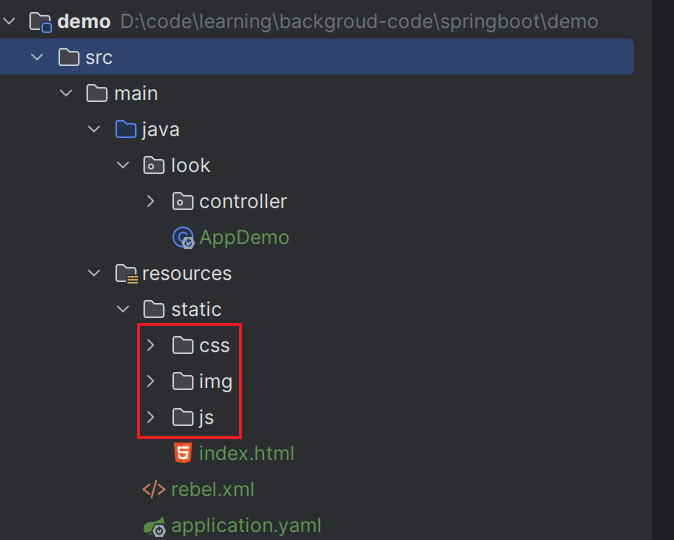
搭建前端页面
页面效果
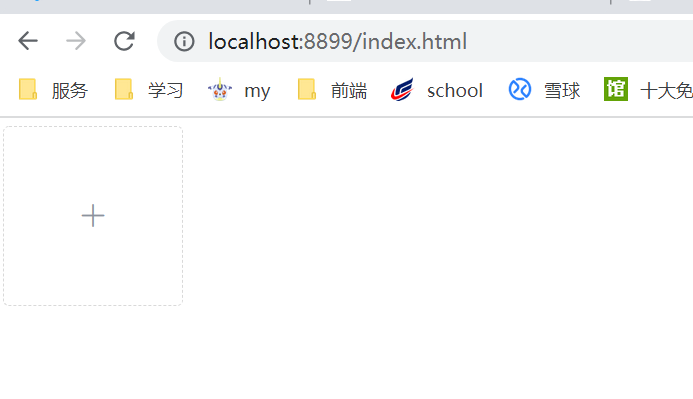
光光这些肯定不够 我们还需要前后端交互的页面
创建的文件名称:index.html
文件位置: /resources/static/index.html
<!DOCTYPE html>
<html lang="en">
<head>
<meta charset="UTF-8" />
<title>测试文件上传</title>
<!-- 引入Vue -->
<script src="https://cdn.jsdelivr.net/npm/vue/dist/vue.js"></script>
<!-- 引入样式 -->
<link
rel="stylesheet"
href="https://unpkg.com/element-ui/lib/theme-chalk/index.css"
/>
<!-- 引入组件库 elementUi-->
<script src="https://unpkg.com/element-ui/lib/index.js"></script>
</head>
<body>
<div id="app">
<el-upload
class="avatar-uploader"
action="http://localhost:8899/upload"
:show-file-list="false"
:on-success="handleAvatarSuccess"
>
<img v-if="imageUrl" :src="imageUrl" class="avatar" />
<i v-else class="el-icon-plus avatar-uploader-icon"></i>
</el-upload>
</div>
</body>
<script>
new Vue({
el: '#app',
data: {
// 图片的url
imageUrl: '',
},
methods: {
//上传成功
handleAvatarSuccess(res) {
// 上传的图片路径
this.imageUrl = res
},
},
})
</script>
<style>
.avatar-uploader .el-upload {
border: 1px dashed #d9d9d9;
border-radius: 6px;
cursor: pointer;
position: relative;
overflow: hidden;
}
.avatar-uploader .el-upload:hover {
border-color: #409eff;
}
.avatar-uploader-icon {
font-size: 28px;
color: #8c939d;
width: 178px;
height: 178px;
line-height: 178px;
text-align: center;
}
.avatar {
width: 178px;
height: 178px;
display: block;
}
</style>
</html>
所使用的依赖
找到 pom.xml
- 因为只用到了接口 我们导入 web 的依赖即可
<parent>
<artifactId>spring-boot-starter-parent</artifactId>
<groupId>org.springframework.boot</groupId>
<version>2.5.0</version>
</parent>
<properties>
<maven.compiler.source>8</maven.compiler.source>
<maven.compiler.target>8</maven.compiler.target>
<project.build.sourceEncoding>UTF-8</project.build.sourceEncoding>
</properties>
<!-- web的依赖-->
<dependencies>
<dependency>
<groupId>org.springframework.boot</groupId>
<artifactId>spring-boot-starter-web</artifactId>
</dependency>
</dependencies>
后端代码
controller
/**
* @author : look-word
* 2022-06-27 22:28
**/
@RestController
public class FileController {
/**
* 设置/img/**的访问规则
* 意思就是当我们访问 http://localhost:8899/img/redis.png的时候
* 会去addResourceLocations这和目录下寻找
*/
@Configuration
public static class MyPicConfig implements WebMvcConfigurer {
@Override
public void addResourceHandlers(ResourceHandlerRegistry registry) {
registry.addResourceHandler("/img/**")
.addResourceLocations("file:"+System.getProperty("user.dir") + "\\src\\main\\resources\\static\\img\\");
}
}
/**
* 接收上传文件的接口
* @param urlFile 上传的文件
* @param request 请求
* @return
*/
@PostMapping("/upload")
public String upload(@RequestParam("file") MultipartFile urlFile,HttpServletRequest request) {
// url =》 http://localhost:8899/upload
StringBuffer url = request.getRequestURL();
// 意思是 取出ip地址加端口 http://localhost:8899
String baseUrl = url.substring(0, url.length() - (url.length() - url.lastIndexOf("/")));
// 文件名称
String fileName = System.currentTimeMillis() + urlFile.getOriginalFilename();
// 文件存储的路径
String filePath = System.getProperty("user.dir") + "\\src\\main\\resources\\static\\img\\";
File file = new File(filePath);
// 当文件夹不存在 创建文件夹
if (!file.exists()) {
file.mkdir();
}
File dest = new File(filePath + fileName);
String storeUrlPath = "/img/" + fileName;
try {
// 写到文件夹中
urlFile.transferTo(dest);
System.out.println("上传成功");
} catch (IOException e) {
System.out.println("上传失败");
throw new RuntimeException(e);
}
return baseUrl+storeUrlPath;
}
}
解析代码
我们现在接收上传文件的接口 打上断点 下面一步一步解析里面的代码
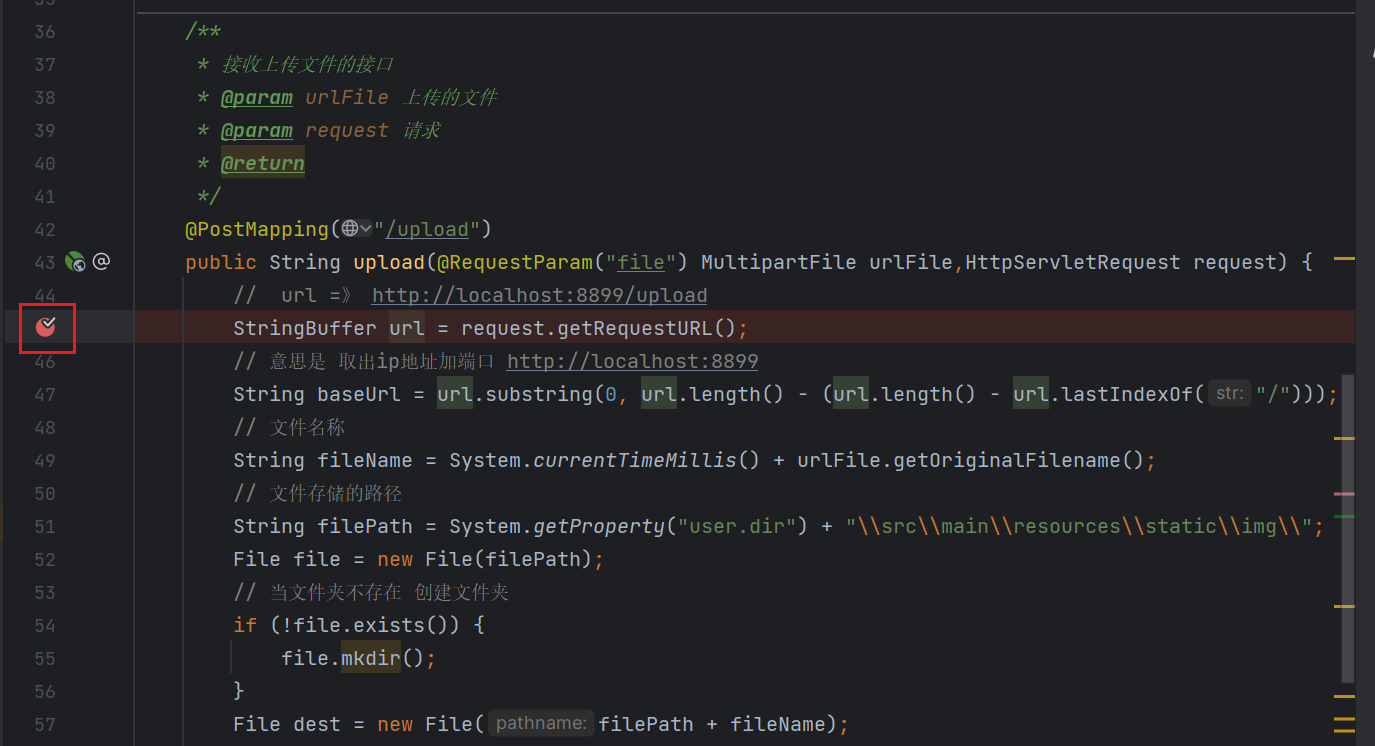
- request.getRequestURL() 意思是 获取当前请求的地址
- http://localhost:8899/upload 是这种格式
- baseUrl: 是截取到http://localhost:8899这串字符
- 在返回到前端页面展示的时候需要用到
- fileName

- System.getProperty("user.dir") 获取的时候 当前项目在磁盘的路径
这样就上传成功啦 那么 我们该如何去访问这个图片呢?
来到这里 当我们访问的资源文件路径为/img开头的时候 会默认 去到"file:"+System.getProperty("user.dir") + "\src\main\resources\static\img\"来寻找 就是我们项目的静态资源文件夹的位置
- 这个位置可以是任意位置
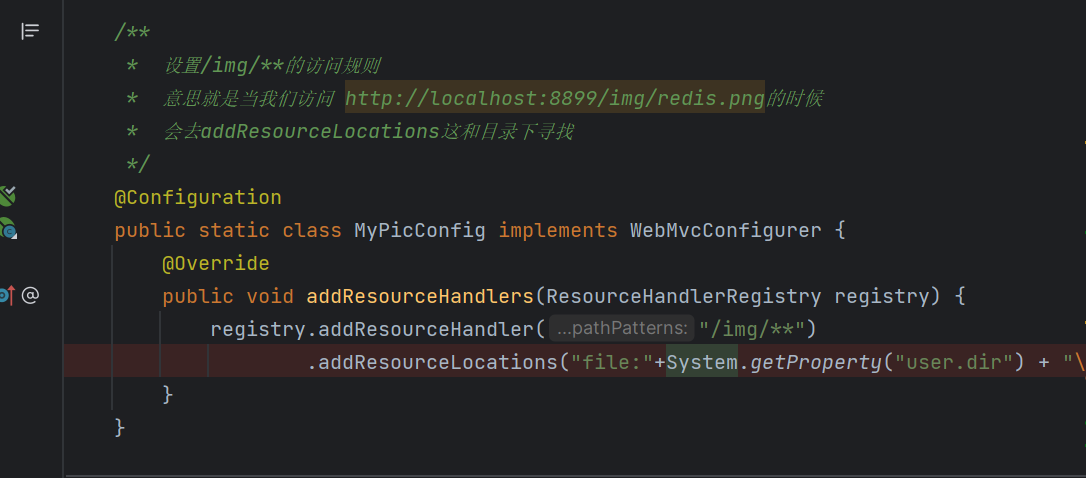
页面效果
可以看到 当我们 上传成功后 资源成功的展示到了 我们的页面上
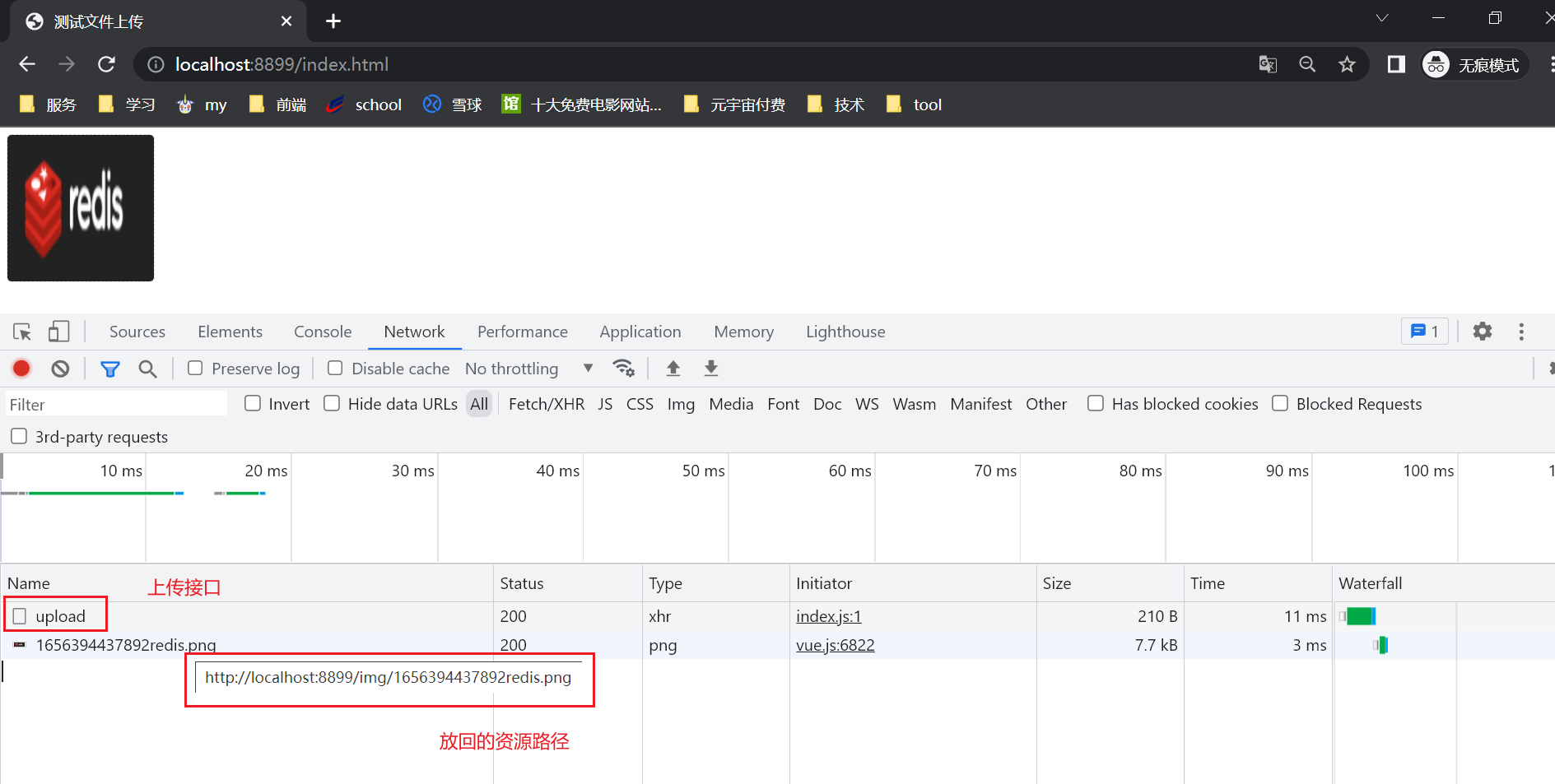

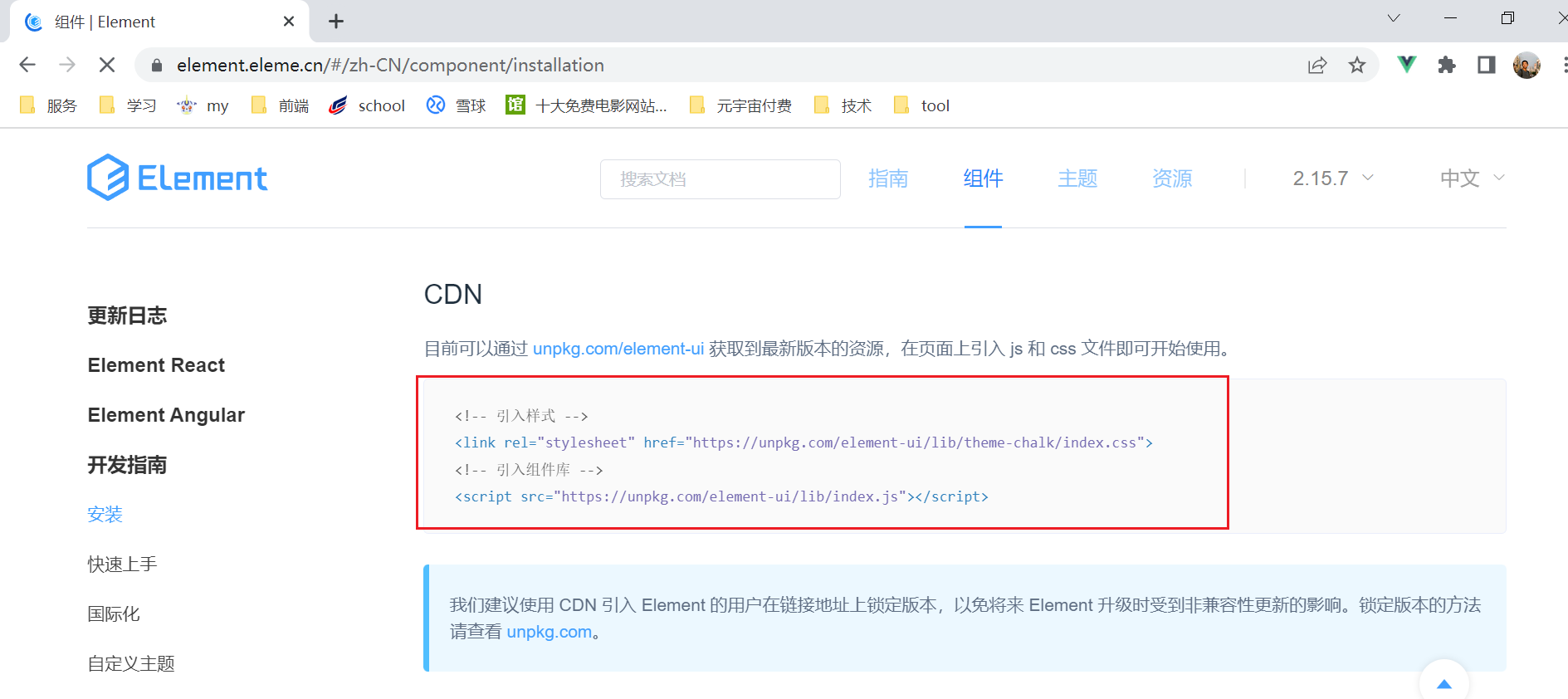

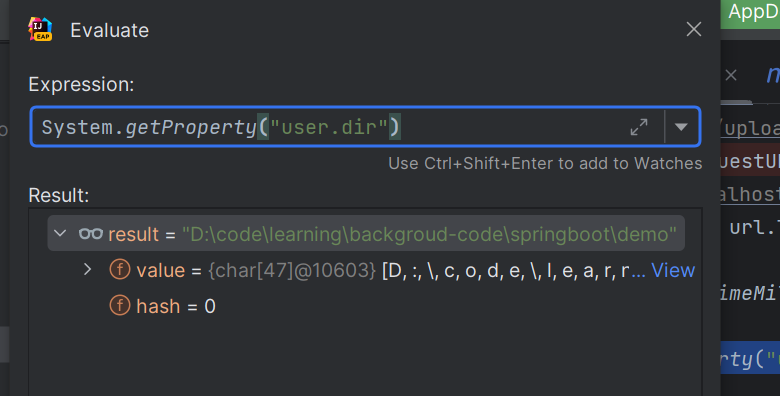


【推荐】国内首个AI IDE,深度理解中文开发场景,立即下载体验Trae
【推荐】编程新体验,更懂你的AI,立即体验豆包MarsCode编程助手
【推荐】抖音旗下AI助手豆包,你的智能百科全书,全免费不限次数
【推荐】轻量又高性能的 SSH 工具 IShell:AI 加持,快人一步
· Manus重磅发布:全球首款通用AI代理技术深度解析与实战指南
· 被坑几百块钱后,我竟然真的恢复了删除的微信聊天记录!
· 没有Manus邀请码?试试免邀请码的MGX或者开源的OpenManus吧
· 园子的第一款AI主题卫衣上架——"HELLO! HOW CAN I ASSIST YOU TODAY
· 【自荐】一款简洁、开源的在线白板工具 Drawnix
2021-06-28 mybatis(1)